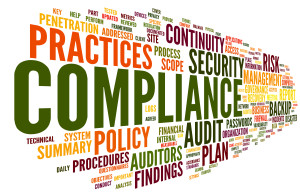Many retail businesses choose to accept card payments in order to meet the needs of shoppers who prefer not to carry cash. While swiping cards at checkout terminals provides customers with a convenient payment option, this also comes with some responsibilities. Enterprises that process, store or transmit cardholder data are required to comply with PCI (Payment Card Industry) security standards. Irrespective of size, merchants that allow customers to pay via debit or credit card can sometimes go through a PCI compliance audit. The purpose behind this audit is to:
- Examine how a business handles cardholder information;
- Identify data security vulnerabilities; and
- Prevent cardholder data from being compromised.
The ultimate goal of auditing businesses that process card payments is to reduce credit card fraud. However, not all businesses are required to go through an audit of this nature. In this guide, you will learn why and when your business may be required to go through a PCI compliance audit and what this process entails.
Is a PCI Validation of Compliance, Mandatory?
The Payment Card Industry Security Standards Council (PCI SSC) developed a system to determine whether retailers should go through an audit or not. This classification system groups, merchants into levels based on the volume of credit or debit card transactions they handle in a year. This process is required if:
- A security breach has compromised cardholder data on your epos software.
- You are a level 1 merchant (handling more than 6 million card transactions per year). Merchants in this category go through an audit at least once a year.
- Your business falls within level 2 to 4 and you feel that you are at an increased risk of a data breach.
What does a PCI Compliance Audit Entail?
Should a PCI compliance assessment be required, only a qualified security assessor (QSA) can carry out the audit. For safety concerns, it is important to ensure that the QSA has proof of approval from the PCI Security Standards Council.
A qualified security assessor is responsible for evaluating all security aspects of your card payment system. He or she will examine policies, procedures, systems and networks in your cardholder data environment. After conducting the risk assessment review, the QSA will identify vulnerabilities in your payment system. Afterwards, the security assessor will compile a Report on Compliance (ROC), documenting all the areas that your POS card processing system needs to improve on. The QSA may also provide training on security awareness and equip your employees with all the skills they need to comply with current PCI standards and regulations.
Any business entity that suffers a data security breach due to non-compliance with PCI DSS regulations may be liable to penalties and fines. However, a PCI compliance audit is meant to improve data security standards of any business that process card payments. In the event of a data breach, an audit will provide guidelines on how to avoid similar incidents in future. By ensuring that your retail business is PCI compliant, you can give customers confidence that their financial information is safe every time they swipe a debit or credit card to make a payment.







